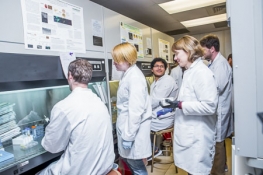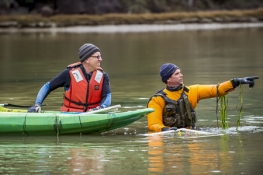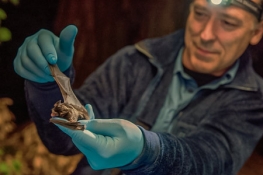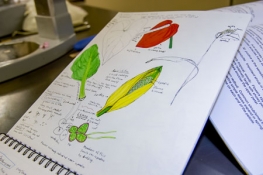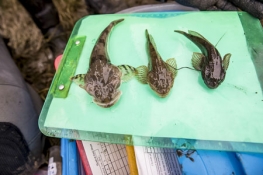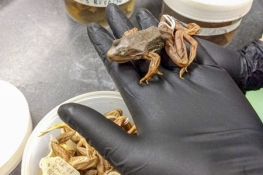Master of Science Requirements and Procedures
Your acceptance into the Master of Science program in the Department of Biological Sciences was based on a review by our faculty of your undergraduate achievement and on our judgment that you have a high probability of succeeding as a graduate student. Academic excellence will be expected of you. Your ability to work and learn independently and to synthesize information will be emphasized over your ability to simply acquire information through classroom instruction. As an integral part of the University community, you will be judged by the faculty on a more personal basis than ever before.
The following departmental guidelines complement those provided in Cal Poly Humboldt's GRADUATE STUDENT HANDBOOK. Departmental requirements meet or exceed requirements established by the University or the State of California.
Section 1 - Requirements
1.1 - General Requirements for the Degree
- A minimum of 30 units of approved upper division and graduate course work beyond the bachelor's degree,
- A minimum of 21 units in residence at Humboldt.
- A minimum grade point average of 3.0 in all approved work taken toward completion of the graduate program.
Establishing California Residency - It is important to review the residency requirements now if you intend to establish California residency for tuition purposes at Cal Poly Humboldt. There are important criterias that must be established at least one year prior to the residency determination dates. For Cal Poly Humboldt, these dates are: Fall Semester, September 20; Spring Semester, January 25; Summer Term, June 1. Living in California for 12 months is not an automatic qualification for in-state tuition! Questions about residency? Please go to: http://www.humboldt.edu/admissions/apply/eligibility/residency.html
NOTE: The Biological Sciences Department stipulates that no grade lower than a B- is applicable to satisfy degree requirements.
1.2 - Requirements for the Master of Science in Biology
- Complete 30 upper division or graduate units in the biological sciences or supporting courses approved by the graduate committee, including BIOL 683 and 684 (normally taken at the first opportunity) and two seminars (BIOL 685). A minimum of 18 units must be at the graduate level (500-600).
- Complete a combined total of not less than four nor more than eight units of BIOL 690 and/or 699 (a maximum of six units in 690 may be applied to the degree program).
IMPORTANT: you must register for a minimum of 2 units of 690 or 699 every semester. It is possible that you may exceed the total unit requirements of these courses by the time you graduate. However, a maximum of eight units is applicable to the degree.
Know Your Limits: Graduate students cannot receive state financial aid for more than 125 percent of the published minimum number of units required for their program of study. Financial Aid Limits & Caps for Graduate Students
- Make satisfactory progress in a timely manner.
- Complete a thesis or project approved by the graduate committee.
- Successfully present and defend your thesis or project in an open presentation to the Biology Department.
Section 2 - Campus Policies & Procedures
University procedures to be followed can be found in the GRADUATE STUDENT HANDBOOK. The following list incorporates the required procedures with recommendations for facilitating timely progress and completion of the degree program. You are responsible for knowing and following these regulations.
NOTE: All University research is required to conform to federal regulations as interpreted by Cal Poly Humboldt and the Institutional Animal Care and Use Committee (IACUC). When living nonhuman vertebrates are used in the lab or in the field, an IACUC Protocol must be submitted. Depending on the level of potential risk to subjects, the time for institutional review can range from one week to several weeks. No research can proceed before having approval from the IACUC committee, therefore please read the IACUC home page.
2.1 - Major Professor. You were assigned a faculty advisor, chosen by you, when you were accepted into the graduate program. This faculty member will act as the supervisor of your thesis or project work and will serve as your counselor on academic and administrative problems.
2.2 - Formation of graduate committee. By the end of your second semester in residence, you must form your graduate committee. Each graduate student has the composition of his or her graduate committee determined in consultation with and approved by the major professor. This committee is responsible for almost all decisions concerning the student's performance and progress toward the degree. The committee consists of four members including the major professor and at least one other Humboldt faculty or adjunct faculty member who holds a Ph.D. or other terminal degree. You may select other committee members from outside the department or university if it is appropriate because of your research or project topic..
2.3 - Initial committee meeting and Advancement to Candidacy. By the end of your second semester you must hold a committee meeting at which time you will do the following:
- Advancement to Candidacy. Complete the Application for Advancement to Candidacy and Graduation Form.
This form must be completely filled in & printed out so your committee can sign off after your meeting. Once you have obtained ALL your committee members signatures, you will need to pay the graduation processing fee at Student Financial Services, SBS 285, or online through your Student Center via myHumboldt - and you must include the receipt # on your form. Note: If you plan to use animals or humans in research, you must obtain approval to do so BEFORE filing for candidacy. PLEASE submit a copy of your form to the Biology Dept. Office, and then you can walk the originals to Academic Programs, SH 217. Once your advancement to candidacy is approved, you are officially a candidate for your master’s degree. The Advancement to Candidacy document is a contract between you and Cal Poly Humboldt that details the requirements of your degree. NOTE: Abstracts must clearly describe the proposed methodology, and must summarize results and finds, not just describe the research or project activities. - Review coursework. Before this meeting you must confer with your major professor to develop a program of coursework that both meets your needs and satisfies the requirements for the degree. It must be clearly understood that your committee may alter this program and add whatever requirement it judges necessary. To assist in program development, you must supply each member of your committee with a summary of courses that you have already taken in pertinent areas (including course numbers and names, years taken, and grades received).
- Make a formal presentation of your research or project proposal at this committee meeting. The presentation shall be both written and oral. The written proposal must be distributed to the committee members at least one week prior to the meeting.
Generally speaking, a thesis is a systematic study of a particular problem, involving original field and/or laboratory work on the part of the student. It is expected that the thesis will satisfy the dictates of the scientific method, will meet the appropriate standards of the field, and will be worthy of publication in a scholarly journal.
A project for this graduate program has a focus on education or the communication and dissemination of scientific ideas. Projects may be in the form of a book, film or digital media, or curriculum resources for educators and must be rigorously based in the biological literature. It evidences originality and independent thinking, appropriate form and organization, and a rationale. It will meet appropriate standards of the field, and will be worthy of publication in a scholarly journal or through professional venues of dissemination.
STUDENTS WHO DO NOT COMPLETE THE ABOVE PROCEDURAL REQUIREMENTS BY THE END OF THEIR SECOND SEMESTER ARE SUBJECT TO DISQUALIFICATION FROM THE GRADUATE PROGRAM.
2.4 - Academic standing. Students are considered in good standing if they maintain an overall GPA of 3.0 in all courses taken at the university since entering the graduate program, and a GPA of 3.0 in all courses taken to satisfy specific degree requirements, and if they are making satisfactory progress toward completion of their degrees.
Under unusual circumstances, a student may be placed on probation and/or disqualified from the graduate program. In accordance with University policy, graduate students who fall below a 3.0 GPA shall be placed on academic probation and given one semester to bring their overall and programmatic GPA above 3.0. Failure to do so will result in disqualification from the program. Students who do not form a graduate committee and advance to candidacy within the first year of residence also are subject to disqualification (see Section 2.3). In addition, students who, in the view of their major professor or committee, are not progressing toward their degree in a timely manner may be terminated. Disqualified students may not register for classes without formal readmission to the university and program.
The Biology Department Graduate Advisory Committee (the Graduate Coordinator, Department Chair, and one additional faculty member) constitutes an appeals committee in matters involving probation and disqualification.
2.5 - Enrollment requirements. Students must enroll for a minimum of 2 units of Biology 690 or Biology 699 each semester. You must obtain from your advisor a permission code and the class number to add these units. An exception to this requirement may be made in cases where taking these two units would bring the total number to more than six units. Such an option will be contingent on the approval of the advisor and graduate coordinator.
2.6 – Leave of Absence. Students may request an educational leave from the program and university for extenuating circumstances. These are normally granted for a period of one semester or one academic year, but they may be extended for a maximum of two years (GRADUATE STUDENT HANDBOOK ). Approval must be sought from your committee by filling out an Educational Leave Agreement. If you fail to formally request a leave, you will be required to apply for readmission to the university when you desire to continue in the program. NOTE: Leaves are considered part of the seven year limit to complete your degree, so you are still on the clock!
NOTE: You will no longer have use/access to department resources, such as lab space, stockroom equipment/supplies, campus computers, etc. while you are on leave. Working on your grad research/thesis projects must be done on your time, in your space. No free rides while regularly enrolled grads must pay tuition and you don’t! You will need to have new key cards generated upon your return.
2.7 - Modifying your program or committee composition. For a variety of reasons, you may find it necessary to modify your approved program of coursework, change committee membership, modify your thesis or project proposal, etc. All such changes require approval of your graduate committee. If you make changes in your course work or committee members, you must complete a Request for Program Variation or Waiver. An Addendum to Advancement to Candidacy is used to request a change in any type of culminating experience after advancement to candidacy, such as: title changes, project changes, coursework changes, or adding an IACUC. Should your graduation date change, you must submit a Graduation Date Change Request
2.8 - Duties as a Teaching Associate. Assignment of duties as a paid Teaching Associate (TA) is recognized as a customary part of graduate education. Subject to availability of funded positions, you can normally expect to be hired to teach at least one lab each semester. Student evaluations are required for each class you teach. Your faculty supervisor will also evaluate you. Both evaluations will be reviewed by the Department Chair at the end of each semester, and all evaluations will become part of your permanent file. Each fall, new graduate students must enroll in the "Methods in Laboratory Instruction" course.
NOTE: To receive a Teaching Assistant Tuition Waiver (EO611), students must file a FAFSA no later than March 2nd each year and be enrolled in graduate units. Students who do not receive the EO611, may be eligible for the State University Grant (SUG). Effective 2016/17 AY: TA waivers are limited to five semesters maximum, available only for eligible students who have completed no more than 125% of the published minimum units of the Masters' program. Both the EO611 and the SUG are contingent upon funding to the campus. Know Your Limits: Graduate students cannot receive state financial aid for more than 125 percent of the published minimum number of units required for their program of study. Financial Aid Limits & Caps for Graduate Students
TA Tuition Waiver (EO611) recipients who enroll for six or fewer total units (at least two of which must be related to their academic program) will be funded for half-time tuition fees, campus based fees are not covered. TA Tuition Waiver (EO611) recipients who enroll for seven or more total units (at least seven of which must be related to their academic program) will be funded for full-time tuition fees, campus based fees are not covered
2.9 - Ordering equipment and supplies and use of facilities. Once your research or project topic has been defined and you have advanced to candidacy, turn your attention to securing funding for your research. Toward the end of each spring semester, the department announces the Master’s Student Grant Program. This program is the mechanism used to secure department funding for graduate student research or project activities by an application process. You will be informed of specific guidelines that must be followed in preparation of your grant request. It is beneficial to see the Stockroom Manager with a list of the research or project materials contained in your grant request prior to submission to the committee. Following award of the grants, the department administrative support staff will inform you of the specific steps you will need to follow in order to obtain your research or project materials and process your travel claims. The Master's Student Grant Program supply requests should be submitted to the Stockroom Manager one week after recipients are notified if supplies are to be used for summer work.
Permission to use certain departmental and university facilities and equipment (e.g., the scanning and transmission electron microscopes, the greenhouse, or the herbarium) has been delegated by the Department Chair to certain faculty coordinators. Please check with the Department Administrative Support Staff for the names of these persons and more information. For use of the Marine Laboratory in Trinidad, contact the lab staff at: (707) 826-3680.
The use of any departmental and/or university facilities is contingent upon registration and enrollment as a regular graduate student. Enrollment through Extended Education normally does not qualify students for use of departmental facilities (see exception, Section 2.5). A student not enrolled in regular course work must, at least, be enrolled in two units of Independent Study (BIOL 699) or Thesis (BIOL 690) to qualify for use of facilities.
2.10 - Completion of coursework. You must, as a matter of University policy, complete all coursework requirements that appear on the program approved at your Advancement to Candidacy committee meeting.

